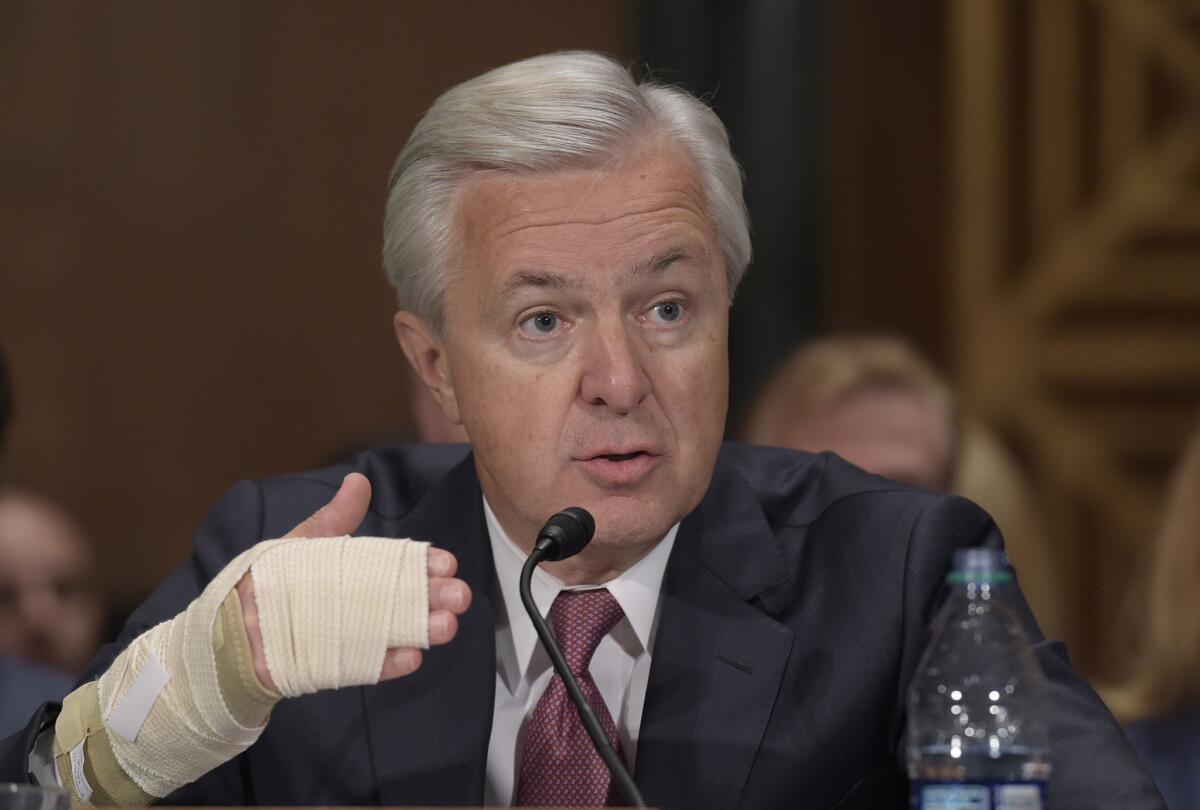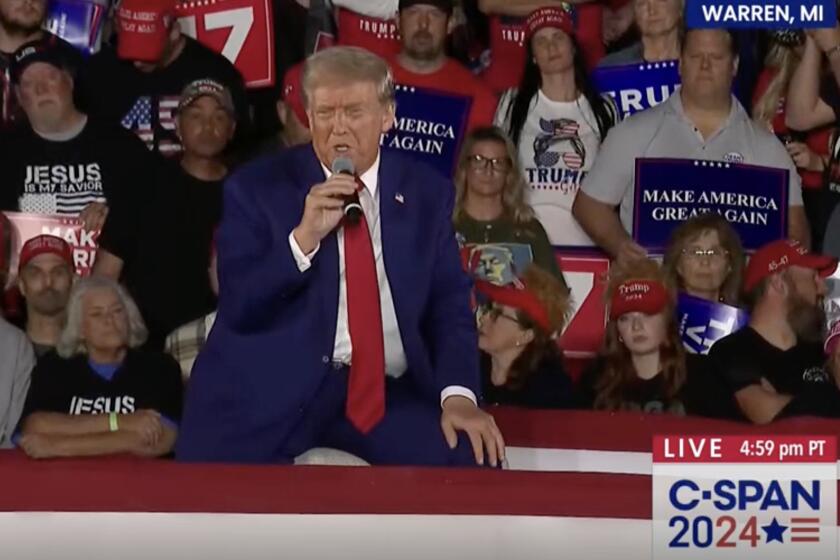Wells Fargo could take back more than $50 million from embattled CEO

Outraged senators castigated Wells Fargo & Co. Chief Executive John Stumpf this week for not seeking to take back some of the $100 million awarded to a retiring executive who oversaw the division at the heart of the company’s fake-accounts scandal.
But whenever Stumpf, 63, eventually departs from his post atop the San Francisco banking giant, he could walk away with far more — nearly $195 million in cash, stock and other compensation, a review of the bank’s regulatory filings show.
While it’s almost certain Stumpf will keep the vast majority of that sum given the bank’s compensation policy, both he and Carrie Tolstedt, the retiring executive who headed the bank’s retail operations, could lose tens of millions of dollars over the still-unfolding scandal.
The bank has agreed to pay $185 million to federal regulators and the Los Angeles city attorney’s office over the creation of as many as 2 million fake accounts, a practice regulators say was encouraged by a demanding and poorly supervised sales culture. But trouble for the bank has continued to grow since the settlement was announced.
Federal prosecutors are investigating the bank to see whether criminal charges should be filed, while senators have called for the Labor Department to investigate possible labor law violations. And there’s a growing chorus of investors, corporate governance experts and others calling for Wells Fargo to cut or cancel executives’ pay over the scandal.
At a Senate Banking Committee hearing last week, Sen. Bob Corker (R-Tenn.) said that the bank would be committing “malpractice from the standpoint of just public relations” if it does not dock executives’ pay. Analysts who follow the bank expect that means both Stumpf and Tolstedt will lose some compensation.
Stumpf has been Wells Fargo’s chief executive since 2007, its chairman since 2010 and has worked for the company or a predecessor for 34 years, amassing a sizable chunk of retirement benefits and stock along the way, on top of his salary and cash bonuses.
He owns 2.4 million shares of Wells Fargo stock outright, according to recent regulatory filings, worth about $111 million at Friday’s closing price of $45.74.
Stumpf also has nearly $20 million in accrued pension benefits and an additional $4.2 million in the company’s 401(k) plan. Add in his annual salary of $2.8 million and that amounts to about $138 million in cash and stock that Stumpf will almost certainly keep. But the rest of his compensation is not so secure.
For starters, Stumpf’s annual pay package this year includes a cash bonus of about $4 million. The bank’s board can opt to pay less than that amount — or nothing at all — depending on Stumpf’s performance.
In paying him a bonus of $4 million last year, the board cited several factors, saying Stumpf had among other things reinforced “a culture of risk management and accountability across the company.”
With the bank under fire for failing to prevent thousands of employees from opening accounts that customers didn’t want, the board could choose to not give that bonus this year. But $4 million is peanuts compared with another chunk of compensation he could lose.
A review of the bank’s regulatory filings shows that Stumpf could receive as many as 1.15 million additional shares of stock over the next three years, though the number could be lower depending on the bank’s financial performance.
Those shares, which have been granted but have not vested — meaning Stumpf does not own them yet — were worth $52.8 million at Friday’s closing price. That’s a substantial figure even for an executive whose annual compensation has totaled about $20 million for the last several years.
For Tolstedt, unvested awards could amount to as many as 612,000 shares, worth just shy of $28 million, according to figures submitted by the bank to the office of Sen. Elizabeth Warren (D-Mass.) The executive also owns shares and vested stock options worth $77.7 million, putting her in line for a total payout of about $105 million, the figures show.
Under normal conditions, unvested shares are fairly secure. Even if an executive retires, resigns under pressure or is fired, the executive could potentially keep all of them.
But Stumpf could lose those shares if a majority of the board voted to fire him “for cause.” That would involve making a finding that the executive failed “to substantially perform his duties” or had violated company policies.
While analysts and corporate governance experts do not expect the board to take such an action, there are other ways to “claw back” compensation they do expect the board to take.
Stock awards that haven’t vested can be clawed back when an executive is negligent or the person’s misconduct harms the bank’s reputation, according to Wells Fargo’s compensation policy.
Jon Lukomnik, executive director of the Investor Responsibility Research Center Institute, a nonprofit corporate governance group, said he would be surprised if the board did not exercise such a provision to claw back shares from Stumpf and Tolstedt.
“They have all the right in the world to take back any nonvested awards,” he said. ”I don’t see that they have an option at this point. But how much they claw back is a more open question.”
Analysts at investment bank and brokerage Keefe Bruyette & Woods support that position. In a research note this week, they wrote that they expect the bank will cancel some compensation for Stumpf, as well as for Tolstedt, who announced her retirement in July but is not departing from her position until the end of the year.
Steven Bank, a professor of business law at UCLA, said it’s possible that Wells Fargo shareholders could take legal action if Stumpf and Tolstedt are not required to give back some unvested shares.
“If they fail to implement their clawback policy, there could be a suit against the board saying their breached their fiduciary duty,” Bank said, though he added it’s not clear whether such a suit would be successful.
During last week’s Senate Banking Committee hearing, senators raised the issue of clawbacks and asked Stumpf to commit to clawing back pay from Tolstedt and possibly other executives.
Stumpf repeatedly declined to take a position, saying any decisions about clawbacks will be left to a committee within Wells Fargo’s corporate board.
“I’m going to let that process proceed,” Stumpf said. “I’m not going to in any way try to influence or prejudice the board.”
Follow me: @jrkoren
ALSO
Towering development is proposed for L.A.’s Arts District: an ‘opportunity for density’
What $600,000 buys in Los Angeles, San Diego and Orange County
American Apparel is losing CEO Paula Schneider, who was supposed to turn it around
More to Read
Inside the business of entertainment
The Wide Shot brings you news, analysis and insights on everything from streaming wars to production — and what it all means for the future.
You may occasionally receive promotional content from the Los Angeles Times.











